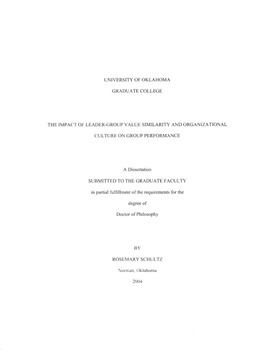| dc.contributor.advisor | Mumford, Michael, | en_US |
| dc.contributor.author | Schultz, Rosemary. | en_US |
| dc.date.accessioned | 2013-08-16T12:19:26Z | |
| dc.date.available | 2013-08-16T12:19:26Z | |
| dc.date.issued | 2004 | en_US |
| dc.identifier.uri | https://hdl.handle.net/11244/741 | |
| dc.description.abstract | Little research has focused on why followers follow their leaders. The current study extends the Leader-Member Exchange (LMX) model to show how positive social exchange produced by leader-group value similarity can influence group task and process performance and how this influence changes for groups in organizations with different cultural structures (Mechanistic vs. Organic) and when leader behaviors (Consideration and Initiating structure) are taken into account. One hundred and twenty university students participated in this quasi-experimental study. The task was to design and build a model bridge in teams of 3--6 people. Results showed that leader-group value similarity could predict group performance, albeit through interactions with the other predictor variables depending on the cultural manipulation provided to the group. Limitations of the study and implications for selecting leaders for groups were discussed. | en_US |
| dc.format.extent | x, 172 leaves ; | en_US |
| dc.subject | Organizational effectiveness. | en_US |
| dc.subject | Teams in the workplace. | en_US |
| dc.subject | Psychology, Industrial. | en_US |
| dc.subject | Leadership. | en_US |
| dc.title | The impact of leader-group value similarity and organizational culture on group performance. | en_US |
| dc.type | Thesis | en_US |
| dc.thesis.degree | Ph.D. | en_US |
| dc.thesis.degreeDiscipline | Department of Psychology | en_US |
| dc.note | Major Professor: Michael Mumford. | en_US |
| dc.note | Source: Dissertation Abstracts International, Volume: 65-04, Section: B, page: 2133. | en_US |
| ou.identifier | (UMI)AAI3128842 | en_US |
| ou.group | College of Arts and Sciences::Department of Psychology | |
